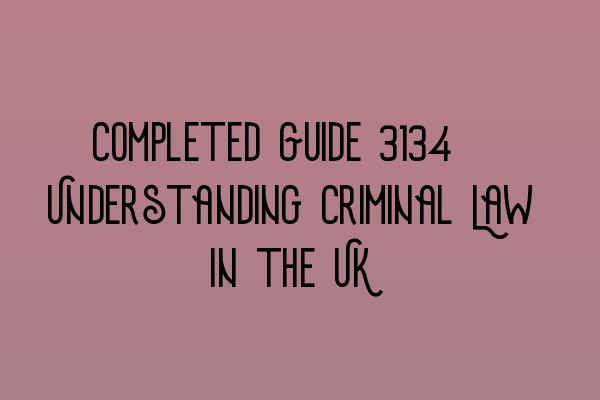Completed Guide 2023: Understanding Criminal Law in the UK
Welcome to SQE Criminal Law & Practice Law UK, your trusted solicitors and experts in criminal law. In this comprehensive guide, we will delve into the intricacies of criminal law in the UK, helping you gain a solid understanding of its concepts, principles, and application. Whether you’re a law student, legal professional, or someone interested in the field of criminal law, this guide will provide you with invaluable insights.
Introduction to Criminal Law
Criminal law is a branch of law that deals with crimes committed against the society, as opposed to civil law that focuses on resolving disputes between individuals. It encompasses a wide range of offenses, from minor misdemeanors to serious felonies, and governs how these offenses are prosecuted and punished.
Understanding criminal law is crucial for various reasons. It allows individuals to know their rights and responsibilities if they find themselves involved in criminal proceedings, helps legal professionals navigate the complex legal landscape, and enables policymakers to shape effective legislation.
Key Concepts in Criminal Law
Before delving deeper into criminal law, let’s familiarize ourselves with some key concepts:
- Mens rea: This Latin term refers to the mental state or intention behind a criminal act. It plays a crucial role in determining whether someone is guilty of a crime.
- Actus reus: Another Latin term, actus reus, refers to the physical act or conduct that constitutes a crime.
- Defenses: Criminal law offers various defenses that can be used to challenge charges or mitigate punishments. These include self-defense, insanity, necessity, and more.
Categories of Crimes
Criminal offenses can be broadly categorized into:
- Summary Offenses: These are minor offenses typically heard in Magistrates’ Courts, such as petty theft, public intoxication, or disorderly conduct.
- Indictable Offenses: Indictable offenses are serious crimes that are tried in Crown Courts. Examples include murder, rape, and robbery.
- Either-Way Offenses: These offenses can be tried in either the Magistrates’ Court or the Crown Court, depending on their severity and aggravating factors.
Procedure in Criminal Cases
Understanding the procedure in criminal cases is vital for both the accused and legal professionals. A typical criminal case follows the following steps:
- Investigation: The police conduct an investigation to gather evidence and identify potential suspects.
- Arrest: If the police have sufficient evidence, they can arrest a person on suspicion of committing a crime.
- Charge: Once arrested, the person is formally charged with the offense.
- Bail: Depending on the seriousness of the offense, the accused might be granted bail while awaiting trial.
- Arraignment: The accused is brought before the court to enter a plea of guilty or not guilty.
- Trial: If the accused pleads not guilty, a trial takes place to determine their innocence or guilt.
- Sentencing: If the accused is found guilty, the court imposes a suitable sentence, taking into account various factors.
Importance of SQE Criminal Law & Practice Law UK
At SQE Criminal Law & Practice Law UK, we understand the significance of comprehensive legal education and preparation. Our SQE 1 Preparation Courses and SQE 2 Preparation Courses are designed to equip aspiring solicitors with the necessary knowledge and skills to excel in the legal profession.
If you’re preparing for the SQE exams, make sure to check out our SQE 1 Practice Exam Questions and SQE 1 Practice Mocks FLK1 FLK2. These resources will give you a valuable opportunity to test your knowledge and improve your performance.
To stay updated with the latest SRA SQE exam dates, visit our page on SRA SQE Exam Dates.
With our expert guidance and comprehensive materials, you can confidently navigate the intricate world of criminal law and achieve your professional goals.
Conclusion
Understanding criminal law in the UK is essential for anyone involved in the legal field. This guide has provided you with an overview of the key concepts, categories of crimes, and the procedural steps followed in criminal cases. At SQE Criminal Law & Practice Law UK, we offer comprehensive preparation courses and resources to help you succeed in your legal career.
For more information and to access our valuable study materials, visit our website at SQE Criminal Law & Practice Law UK.
